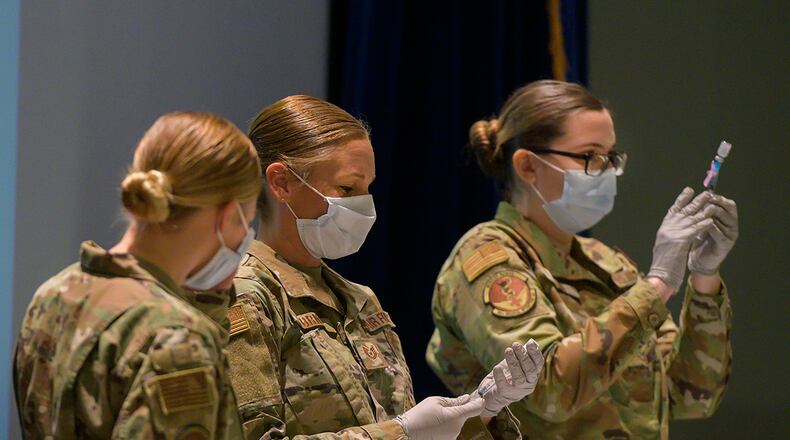Wright-Patterson Air Force Base, Ohio’s largest single-site employer with more than 30,000 employees, will follow the Department of Defense and Air Force guidance when they receive it, a spokesperson said. Wright-Patt did reinstitute its indoor face mask policy on Thursday, regardless of COVID-19 vaccination status.
Col. Patrick Miller, 88th Air Base Wing and Installation Commander, said the mandate takes effect immediately and is in accordance with updated U.S. Department of Defense guidance.
The National Museum of the U.S. Air Force also announced Thursday that all visitors and staff will be required to wear masks, regardless of vaccination status, starting today. Children younger than 3 will not have to wear a mask.
Nick Riplinger, president of Dayton-based Battle Sight Technologies, said his company will have no issues with strict vaccination guidelines for federal contractors. All seven of the company’s workers are vaccinated, he said.
“We have a strong desire to be compliant on all the requirements that our customers put on us,” he said. “If it’s going to protect these brave men and women out there still fighting the fight, absolutely, we will comply.”
Dan Tierney, a spokesman for Ohio Gov. Mike DeWine, said the state will focus its efforts on promoting a monetary incentive program it introduced this week to encourage state employees to get vaccinated.
Beginning Monday, state employees who get the vaccination will get $100 and their spouse will receive $25. State employees who have already been vaccinated are also eligible.
The state has offered incentives for many other vaccines in the past, and they’ve been successful, Tierney said.
“The cost of these incentives are just a fraction of the cost that somebody would have if they got COVID,” he said. “We know that a severe case of COVID (may) require intensive care, or ventilators, and those are hundreds of thousands of dollars in costs.”
The strict new federal guidelines are aimed at boosting sluggish vaccination rates among the huge numbers of Americans who draw federal paychecks and to set an example for private employers around the country.
Biden also announced that small- and medium-sized businesses will receive reimbursements if they offer employees time off to get family members vaccinated.
Biden’s move for the federal government — by far the nation’s largest employer — comes in the face of surging coronavirus rates driven by pockets of vaccine resistance and the more infectious delta variant. A number of major corporations and some local governments are ordering new requirements on their own, but the administration feels much more is needed.
However, pushback is certain. The action puts Biden squarely in the center of a fierce political debate surrounding the government’s ability to compel Americans to follow public health guidelines.
The move could work, said Lawrence Gostin, a professor of global health law at Georgetown University Law School.
“People would much rather roll up their sleeves and get a jab, than undergo weekly testing and universal masking,” he said. “In many ways, this is really not a mandate, it’s giving workers a choice.”
About 60% of American adults have been fully vaccinated. Biden had set a July 4 goal to get at least one shot in 70% of adults, and is still not quite there. The latest figure is 69.3.
According to the Office of Personnel Management, the executive branch employed more than 2.7 million civilians in 2020.
But Thursday’s move is not just about federal workers.
The administration hopes it will nudge private companies to push their workers harder to get vaccines that, while widely recognized as safe and effective, have yet to receive full approval from the Food and Drug Administration.
“We’ve reached this tipping point, and Biden’s announcement will provide a lot of air cover for companies and boards of directors who have difficult decisions facing them,” said Jeff Hyman, a Chicago-based business author and recruiter for start-up companies.
Employers want to get their workers vaccinated but have been holding back, said Andrew Challenger, senior vice president of Challenger, Gray & Christmas, a major workforce consulting firm.
“It is a large risk over the head of every employer if there is an outbreak at the office,” he said. “But so far we have seen very few employers using a stick instead of carrots.”
Gostin agrees: “We’ve begged, pleaded, cajoled people to be vaccinated; we’ve offered them incentives, and it’s clear that that is not working.”
Some of the nation’s biggest corporations have moved to require vaccinations for their workers. Tech giants Facebook and Google announced this week their employees would have to show proof they’ve been fully vaccinated before returning to work.
But fewer than 10% of employers have said they intend to require all employees to be vaccinated, based on periodic surveys by the research firm Gartner.
Questions about the new policy’s scope remain. The guidance is not expected to cover the military, but it’s unclear if it will cover federal contractors. The White House hopes that releasing the new guidelines now will give agencies enough time to craft their own plans for implementation before workers return fully to offices.
And there is already opposition.
State lawmakers across the U.S. have introduced more than 100 bills aiming to prohibit employers from requiring vaccination as a condition of employment, according to the National Academy for State Health Policy. At least six states have approved such bills.
The Justice Department and the federal Equal Employment Opportunity Commission have both said no federal laws prevent businesses from requiring vaccinations as a condition of employment and the federal policy would take precedent. But the “medical freedom” bills underscore the resistance such guidance may encounter at the state level.
Ohio COVID-19 cases reported Thursday
1,205: New cases Thursday
631: 21-day case average in Ohio
80: Daily hospitalizations
5,735,000: People in Ohio have started the vaccine
5,745,000: People have finished the vaccine
Source: Ohio Department of Health.
